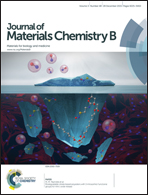Reactive oxygen species (ROS) responsive PEG–PCL nanoparticles with pH-controlled negative-to-positive charge reversal for intracellular delivery of doxorubicin†
Abstract
Nanocarriers have been extensively explored for cancer drug delivery with their ability to respond to cancer heterogeneity which is recently recognized as a critical doorway to a high therapeutic index. We proposed to develop a polycaprolactone bearing acid-labile β-carboxylic amide segments with charge reversal properties, which was coupled to mPEG with thioether as a linker. The linker could respond to overproduced reactive oxygen species (ROS) of cancer cells (ROS, e.g., perhaps more than one order of magnitude higher than healthy cells). This tailor-made surface charged nanoparticles (NPs) exhibited a capacity of reversing its surface charge from negative to positive at a tumor extracellular environment (pH ∼ 6.8) for enhancing cell internalization and an ability of response to the tumor ROS heterogeneity at the tumor intracellular environment to accelerate the release of drugs from NPs. The in vitro release studies showed that DOX release was greatly accelerated under the intracellular prevailing ROS (hydrogen peroxide (H2O2) simulating the oxidative stress). Cell uptake showed that the NPs could be more effectively internalized at pH 6.8 (simulating tumor extracellular conditions) than at pH 7.4. The MTT assay demonstrated that the DOX loaded NPs showed significant cytotoxicity to HepG2 cancer cells while no influence on the L02 normal cells. These ROS sensitive and surface charged NPs with superior cell internalization ability and rapid intracellular drug release provided a novel platform for tumor-targeting drug delivery.


 Please wait while we load your content...
Please wait while we load your content...